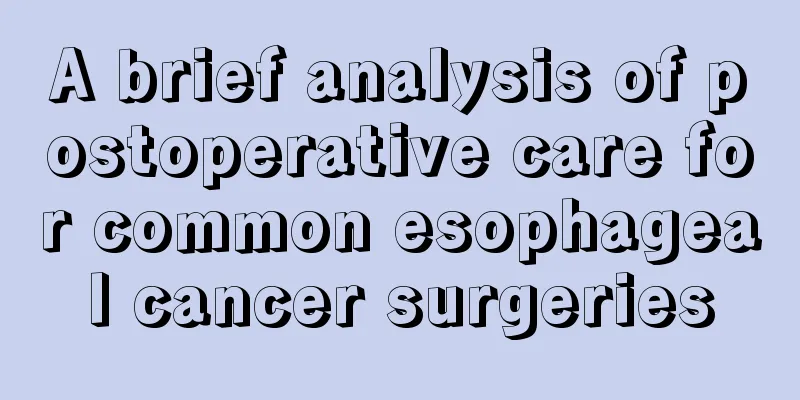A brief analysis of postoperative care for common esophageal cancer surgeries

|
Esophageal cancer surgery is one of the most common methods of treating esophageal cancer. Many esophageal cancer patients will choose esophageal cancer surgery to treat esophageal cancer. In view of this, the following will talk about the postoperative care of esophageal cancer surgery. Keep the gastrointestinal decompression tube unobstructed. A small amount of blood drained out within 24 to 48 hours after esophageal cancer surgery should be considered normal. If a large amount of blood is drained, the doctor should be notified immediately. The gastrointestinal decompression tube should be retained for 3 to 5 days to reduce the tension of the anastomosis and facilitate healing. Pay attention to the accurate connection of the gastric tube, firm fixation, prevention of dislocation, and smooth drainage. Closely observe the amount and nature of chest drainage. If abnormal bleeding, turbid fluid, food residue or chyle is found in the chest drainage fluid, it indicates active bleeding in the chest cavity, esophageal anastomotic fistula or chylothorax. Appropriate measures should be taken to make a clear diagnosis and treat it. If there is no abnormality, the drainage tube should be removed 1 to 3 days after esophageal cancer surgery. This is the common postoperative care for esophageal cancer surgery. Strictly control diet. The esophagus lacks a serosal layer, so the anastomosis heals slowly. After esophageal cancer surgery, strict fasting and water abstinence are required. During the fasting period, intravenous fluid is replenished daily. For those who have a duodenal dropper placed, nutrient solution can be dripped through the catheter after intestinal peristalsis is restored on the second day after esophageal cancer surgery to reduce the amount of infusion. On the fifth day after esophageal cancer surgery, if there is no special change in the condition, milk can be taken orally, 60ml each time, every 2hl. During the interval, an equal amount of boiled water can be given. If there is no adverse reaction, the amount can be increased day by day. On the 10th to 12th day after surgery, a residue-free semi-liquid diet should be adopted, but care should be taken to prevent eating too fast and in excess. The above is an introduction to the postoperative care of common esophageal cancer surgeries. I believe everyone has some understanding of esophageal cancer surgeries. Once you have esophageal cancer, you must go to the hospital for treatment in time to avoid delaying the disease. For more information, please visit the esophageal cancer disease special topic at http://www..com.cn/zhongliu/sda/ or consult an expert for free. The expert will then give a detailed answer based on the patient's specific situation. |
<<: A brief analysis of common colorectal cancer care precautions
>>: Brief analysis of common treatment methods for primary esophageal cancer
Recommend
What are the causes of thyroid cancer?
What are the causes of thyroid cancer? The occurr...
What are the examination methods for colorectal cancer
Colorectal cancer emphasizes early diagnosis and ...
Bone cancer is most likely to cause functional impairment in people
Bone cancer is most likely to cause functional im...
How to quickly relieve headaches during pregnancy?
Although pregnancy and childbirth are common thin...
Blood test can tell you your life span
The era of predicting the date of death is coming...
What kind of tea to make for gynecological inflammation
Many plants can be used to make tea. Common ingre...
There are 5 factors that cause gum ulcers
Gingival ulcers are believed to be familiar to pe...
What are the complications caused by bile duct cancer
What are the complications caused by bile duct ca...
Treatment for toothache caused by getting angry
There are many reasons for toothache, such as var...
The mortality rate of artificial urticaria
Artificial urticaria is caused by bacterial infec...
Will lung cancer definitely cause coughing up blood?
Will lung cancer definitely cause coughing up blo...
Why does Pu'er tea need to be pressed into cakes
Pu'er tea has a long history of being made in...
Brief analysis of three common treatments for rectal cancer
Rectal cancer is a tumor that is difficult to com...
Orthodontic surgery
Generally, the most common oral deformity is toot...
How to choose a good hospital for bladder cancer
We have a lot of doubts about the occurrence of b...









